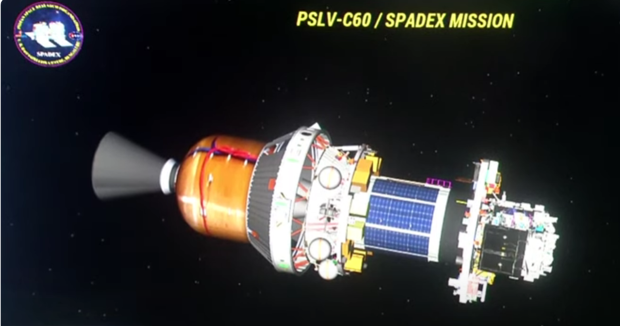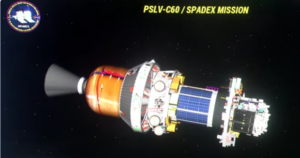“PSLV-C60: Empowering Space Innovation with POEM-4 and Private Collaboration.”

On December 30, 2024, the Indian Space Research Organization (ISRO) successfully launched the PSLV-C60/SPADEX mission, marking yet another milestone in India’s space endeavors. This mission carried out in-orbit scientific experiments at an altitude of 350 km with a 55-degree inclination, utilizing the spent PS4 stage repurposed as the PSLV Orbital Experimental Module (POEM-4). The innovative use of the fourth stage of the PSLV as an orbital experiment module has opened up new possibilities for cost-effective and rapid space research.
The Indian National Space Promotion and Authorization Centre (IN-SPACe), an autonomous nodal agency under the Department of Space, played a pivotal role in facilitating this mission. On December 31, IN-SPACe announced the successful establishment and operationalization of 10 hosted payloads from Non-Government Entities (NGEs) aboard the POEM-4 module. These payloads represent a significant step forward in fostering collaboration between government space initiatives and private sector players.
In total, 24 PS4-Orbital Experiment Module (POEM-4) payloads were deployed onboard the PSLV-C60 SpaDeX mission, supporting a wide array of scientific and technological objectives. The inclusion of 10 payloads from NGEs underscores the growing participation of private entities in India’s space sector. Among these are notable contributions such as the RV-SAT1 from RV Engineering College, Bengaluru. This payload aims to study the behavior of gut bacteria Bacteroides thetaiotaomicron and prebiotic effects in microgravity. Another significant payload is the APEMS from Amity University Maharashtra, Mumbai, designed to examine growth-related changes in plant callus of Spinacia oleracea (spinach) under microgravity and natural gravity conditions.
Dr. Pawan Goenka, Chairman of IN-SPACe, emphasized the importance of missions like PSLV-C60/SPADEX in building capacity and reducing entry barriers for private players in the space sector. He noted, “The PSLV Orbital Experiment Module (POEM) is a practical solution deployed by ISRO that allows Indian start-ups, academic institutions, and research organizations to test their space technologies without the need to launch entire satellites. By making this platform accessible, we are reducing entry barriers and enabling a wider range of entities to contribute to the space sector. At IN-SPACe, our role is to create opportunities for such collaborations and ensure that India’s private sector can grow alongside advancements in space technology.”
The POEM platform, equipped with essential capabilities such as power supply, telemetry, and command support, enables seamless operations for onboard experiments. By leveraging existing infrastructure, it provides an economical approach to diverse research pursuits. This innovative model not only enhances the scope for scientific exploration but also helps NGEs in getting their payloads space-qualified, thereby bolstering their future satellite launch missions.
As India continues to advance its space program, missions like PSLV-C60/SPADEX exemplify the country’s commitment to fostering innovation and collaboration. With platforms like POEM, India’s space ecosystem is poised to achieve new heights, enabling a broader spectrum of contributors to participate in and benefit from space exploration.







